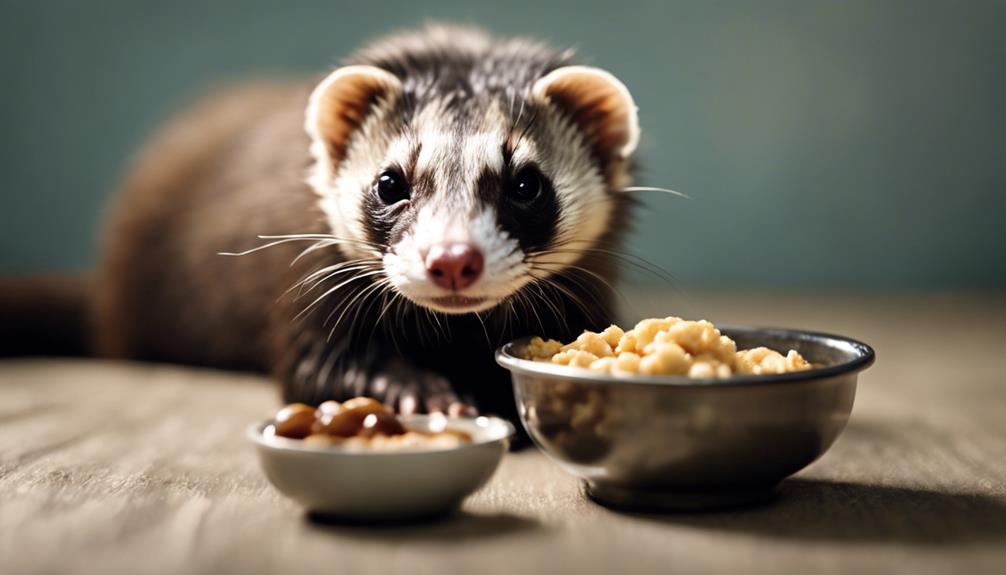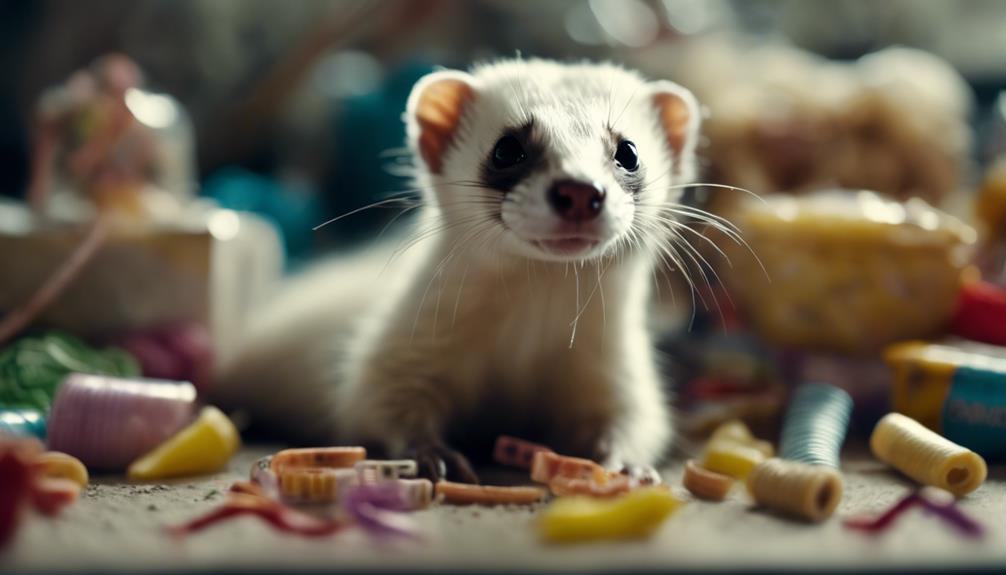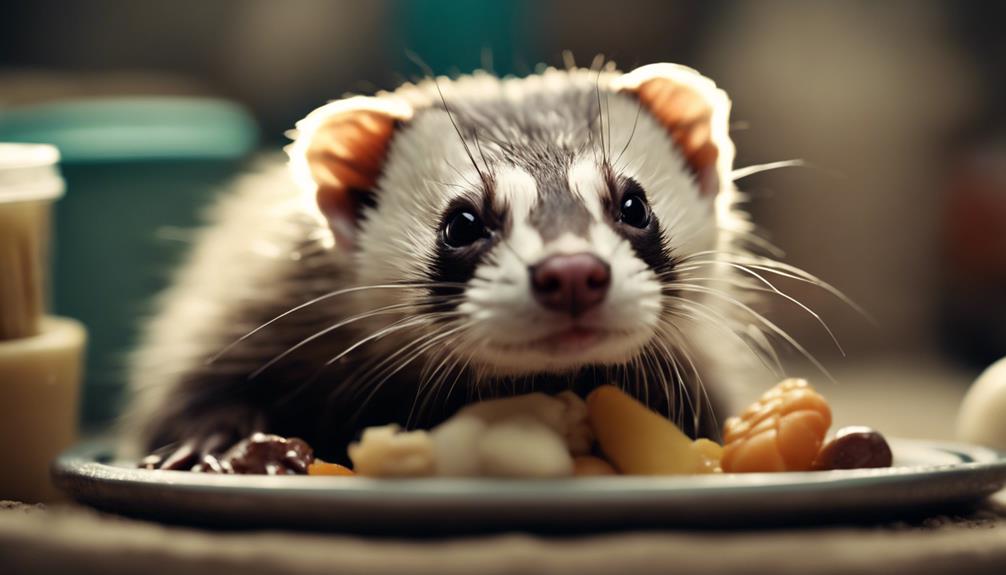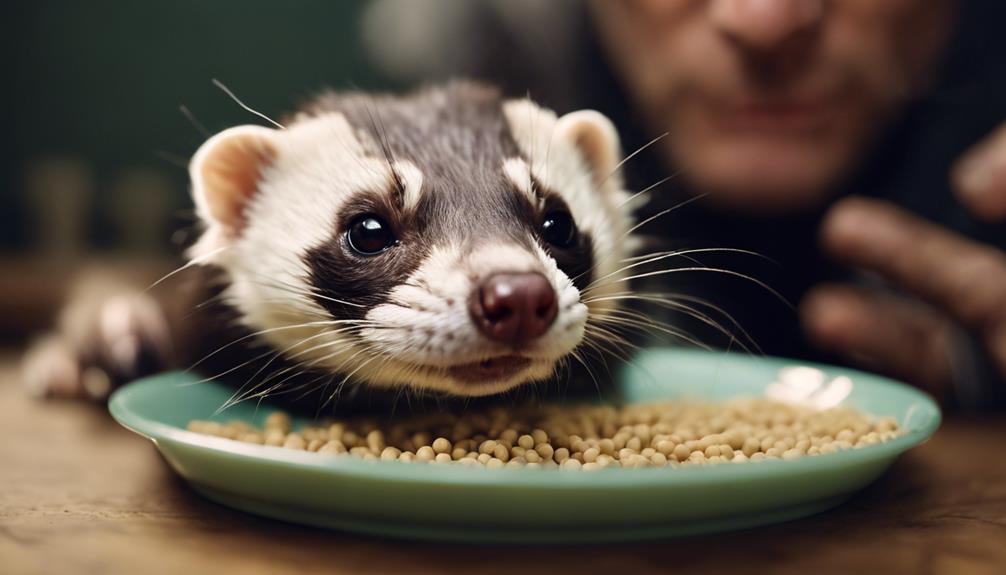When to Consult a Vet About Your Ferret's Diet

If you notice any changes in your ferret's appetite, weight, or energy levels, it's essential to consult a vet. Additionally, if your ferret is experiencing diarrhea, vomiting, or any other digestive issues, a vet visit is necessary. Changes in fur quality, such as dullness or excessive shedding, can also indicate a problem with your ferret's diet. Finally, if your ferret is exhibiting unusual behavior or seems unwell, seeking professional advice is crucial. Double-checking with a vet ensures your ferret's diet is meeting their nutritional needs and keeping them healthy.
Unexplained Weight Loss
If your ferret is experiencing unexplained weight loss, it's crucial to consult a veterinarian promptly to investigate potential underlying health issues. Nutritional deficiencies, medical conditions, metabolic disorders, and dental issues can all contribute to weight loss in ferrets.
Nutritional deficiencies may arise from an improper diet lacking essential nutrients vital for your ferret's health. Medical conditions such as gastrointestinal diseases or infections could also lead to weight loss. Metabolic disorders like insulinoma, a condition where the pancreas produces too much insulin, can cause rapid weight loss in ferrets. Additionally, dental issues such as overgrown teeth or dental abscesses may result in decreased appetite and weight loss in these small animals.
Early intervention is key when addressing unexplained weight loss in ferrets. A thorough examination by a veterinarian will help identify the root cause of the weight loss and guide appropriate treatment strategies to ensure your ferret's well-being. Prioritizing your ferret's health through timely veterinary care is essential for maintaining their quality of life.
Consistent Digestive Issues

Ferrets experiencing consistent digestive issues may present with chronic stomach problems, frequent episodes of diarrhea, and recurring incidents of vomiting.
These symptoms can indicate underlying health issues or dietary intolerances that need to be addressed promptly.
Consulting a veterinarian is crucial to diagnose the root cause and implement appropriate treatment to ensure the well-being of the ferret.
Chronic Stomach Problems
Experiencing chronic stomach problems in ferrets can be indicative of underlying health issues that require prompt veterinary attention. Dietary adjustments, such as introducing a higher quality, easily digestible ferret food, can often help alleviate stomach problems.
It's vital to consult a vet before making any significant changes to the ferret's diet. Nutritional supplements like probiotics may also aid in promoting a healthy digestive system. However, it's crucial to follow the vet's recommendations regarding the type and dosage of supplements to avoid further complications.
Chronic stomach issues can impact a ferret's overall health and well-being, making it essential to address these problems promptly with the guidance of a qualified veterinarian to ensure the best possible outcome for the furry companion.
Frequent Diarrhea Episodes
Chronic stomach problems in ferrets can lead to frequent diarrhea episodes, indicating persistent digestive issues that necessitate veterinary assessment and dietary adjustments.
Nutritional imbalances or dietary triggers may contribute to digestive sensitivity in ferrets, leading to diarrhea. It's crucial to consult a vet if your ferret experiences frequent diarrhea, as this could signify an underlying health issue that requires attention.
The vet may recommend dietary adjustments to address the nutritional imbalances or triggers causing the digestive problems. Ensuring a balanced and suitable diet is essential for maintaining your ferret's digestive health and overall well-being.
Recurring Vomiting Incidents
Suffering from recurrent vomiting episodes can indicate consistent digestive issues in ferrets, signaling a need for veterinary evaluation and potential dietary modifications. Vomiting in ferrets can be a serious concern and may require specialized attention. Here are some key points to consider:
- Gradual dietary adjustments may help in identifying triggers or intolerances.
- Consulting a vet for a thorough examination and diagnostic tests is crucial.
- Exploring nutritional supplements under veterinary guidance can aid in balancing the ferret's diet.
- Monitoring water intake is essential to prevent dehydration from vomiting episodes.
- Keeping a detailed journal of the ferret's diet and vomiting incidents can assist the vet in making informed decisions.
Changes in Appetite

Ferrets experiencing sudden appetite loss or increased food consumption may be indicating underlying health issues that require prompt attention.
Sudden changes in appetite can be a sign of dental problems, gastrointestinal disturbances, or metabolic disorders.
Monitoring your ferret's eating habits closely and seeking veterinary advice promptly can help address these issues effectively.
Sudden Appetite Loss
A sudden decrease in appetite can signal underlying health issues in ferrets and should prompt immediate veterinary consultation. When a ferret experiences sudden appetite loss, it may be due to various factors that require intervention:
- Nutritional deficiencies: Inadequate intake of essential nutrients can lead to decreased appetite.
- Underlying illness: Health conditions such as gastrointestinal problems or infections can cause appetite loss.
- Environmental stressors: Changes in the ferret's environment, such as loud noises or new pets, can impact their eating habits.
- New food introduction: Introducing unfamiliar food may result in rejection by the ferret, leading to reduced appetite.
- Pain or discomfort: Ferrets experiencing pain or discomfort may show a decrease in appetite as a sign of their distress.
Consulting a veterinarian is crucial to identify and address the underlying cause of sudden appetite loss in ferrets.
Increased Food Consumption
Increased food consumption in ferrets can be indicative of various underlying factors that warrant veterinary evaluation. When a ferret starts eating more than usual, it could signal a change in their nutritional requirements or an underlying health issue.
While occasional variations in appetite are normal, a persistent increase in food intake may require adjustments in meal planning or indicate a need for a vet consultation. Ferrets have specific dietary needs, and sudden changes in their eating habits could point to deficiencies or excesses in their diet.
Consulting a vet can help identify the root cause of the increased food consumption and ensure that the ferret's nutritional needs are being met through appropriate meal planning and dietary adjustments.
Unusual Eating Habits

Noteworthy variations in eating patterns among ferrets may indicate underlying health issues that warrant attention from a veterinarian. Ferrets, like humans, can exhibit unusual eating habits that may signal potential problems. Here are some signs to look out for:
- Refusing Food: If a ferret suddenly refuses its favorite treats or meals, it could be a red flag.
- Picky Eating: Displaying sudden taste preferences or avoiding certain foods may indicate digestive issues.
- Overeating: Consuming excessive amounts of food can lead to obesity and other health issues.
- Hoarding Food: Stockpiling food in odd places instead of eating it immediately could signify stress or dental problems.
- Eating Non-Food Items: Ingesting non-edible items like fabric or plastic may indicate a serious health concern.
Observing and understanding these unusual eating habits in ferrets is crucial for maintaining their well-being. If you notice any of these behaviors, consult a vet promptly to address any underlying health issues and ensure your ferret's diet is appropriate for their needs.
Hair Loss or Dull Coat

Examine your ferret's overall health by observing for signs of hair loss or a dull coat, which can indicate underlying health issues requiring veterinary attention. Hair loss or a coat that lacks luster can be concerning for ferret owners. These symptoms may be linked to various factors such as nutritional deficiencies, grooming habits, seasonal shedding, or environmental factors.
| Signs to Watch For | Possible Causes | What to Do |
|---|---|---|
| Patchy Hair Loss | Nutritional Deficiencies | Consult a Vet |
| Dull, Dry Coat | Inadequate Grooming | Improve Grooming Routine |
| Excessive Shedding | Seasonal Changes | Monitor and Brush Regularly |
| Bald Spots | Parasites or Infections | Seek Veterinary Treatment |
| Skin Irritation or Redness | Allergies or Dermatitis | Vet Consultation Recommended |
If you notice any of these signs in your ferret, it's crucial to seek professional advice promptly. A vet can conduct a thorough examination to determine the root cause and provide appropriate treatment. Remember, a healthy coat is not only a sign of good grooming but also an indicator of overall well-being.
Persistent Lethargy

Observing persistent lethargy in your ferret can raise concerns about its health and well-being, indicating a potential need for veterinary evaluation to identify underlying causes and provide appropriate care. When dealing with a lethargic ferret, several factors could be at play:
- Nutritional Imbalances: Deficiencies or excesses in certain nutrients may lead to decreased energy levels and overall lethargy.
- Underlying Health Issues: Undiagnosed health conditions such as infections or organ dysfunction can manifest as lethargy in ferrets.
- Environmental Stress: Changes in the environment, such as loud noises or overcrowding, can cause stress in ferrets, leading to decreased activity levels.
- Lack of Exercise: Inadequate physical activity can result in lethargy and negatively impact a ferret's overall health.
- Behavioral Changes: While not addressed here, sudden shifts in behavior can also contribute to persistent lethargy and should be monitored closely.
Addressing these factors promptly through consultation with a veterinarian is crucial to ensure your ferret's well-being and vitality.
Behavioral Changes

When assessing behavioral changes in your ferret, it's essential to monitor for alterations in its daily routines and interactions with its environment.
Dietary preferences and nutritional deficiencies can lead to significant behavioral shifts in ferrets. If your ferret suddenly shows aversion to certain foods it used to enjoy, it could indicate a nutritional deficiency. On the other hand, food aggression or eating disorders might manifest as aggressive behavior during feeding times or a loss of interest in food altogether.
These behavioral changes can be concerning and may require veterinary intervention to address underlying health issues. Observing how your ferret interacts with its food, its feeding patterns, and overall demeanor can provide valuable insights into its well-being.
Seeking professional guidance can help determine the root cause of these behavioral changes and ensure that your ferret receives the proper care and dietary adjustments to support its health and happiness.
Frequently Asked Questions
Can My Ferret's Diet Affect Their Dental Health?
A ferret's diet plays a significant role in their dental hygiene. Poor nutrition can lead to tooth decay and other oral health issues. It is crucial to provide a balanced diet to ensure your ferret maintains good dental health.
How Often Should I Be Changing My Ferret's Food to Ensure a Balanced Diet?
Changing a ferret's food frequently won't guarantee a balanced diet. Instead, focus on quality and variety. Incorporate dietary supplements and diverse protein sources to ensure optimal nutrition. Consult a vet if unsure about specific dietary needs.
Are There Any Specific Dietary Requirements for Older Ferrets?
Older ferrets have specific dietary requirements. It's essential to adjust their protein needs, consider supplements for digestion. Weight management becomes crucial to their health. Regular vet consultations ensure a balanced diet and address any concerns promptly.
Can I Feed My Ferret Fruits and Vegetables as Treats?
Fruits and vegetables can be fed as treats to ferrets in moderation. While they offer some nutritional value and benefits for the digestive system, there are limitations. Consult a vet for specific dietary advice.
How Can I Prevent Obesity in My Ferret Through Their Diet?
To prevent obesity in a ferret through their diet, one should focus on an appropriate exercise regimen and portion control. Ensure protein sources are high-quality, and monitor fat content. Consulting a vet for tailored advice is advisable.











